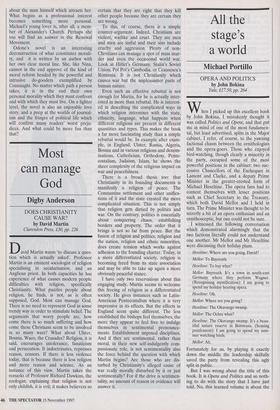Most can manage God
Digby Anderson
DOES CHRISTIANITY CAUSE WAR?
by David Martin Clarendon Press, £30, pp. 226 David Martin wants 'to discuss a ques- tion which is actually asked'. Professor Martin is an eminent sociologist of religion specialising in secularisation, and an Anglican priest. In both capacities he has experience of what causes modern people difficulties with religion, specifically Christianity. What puzzles people about religion, he finds, is not, as is often supposed, God. Most can manage God. There is no need to represent God in some trendy way in order to stimulate belief. The arguments that worry people are, how come there is so much suffering and how come these Christians seem to be involved in so many wars? What about Ulster, Bosnia, Waco, the Crusades? Religion, it is said, encourages intolerance, fanaticism and persecution. It indoctrinates, represses reason, censors. If there is less violence today, that is because there is less religion and more reason and science. As an instance of this view, Martin takes the remarks of Professor Richard Dawkins, the zoologist, explaining that religion is not only childish, it is evil; it makes believers so certain that they are right that they kill other people because they are certain they are wrong.
To this, of course, there is a simple counter-argument. Indeed, Christians are violent, warlike and cruel. They are men and men are sinful and their sins include cruelty and aggression. Plenty of non- Christians can manage a spot of mass mur- der and even the occasional world war. Look at Hitler's Germany, Stalin's Soviet Union, Pol Pot's Cambodia, or Ceausescu's Romania. It is not Christianity which causes war but the unpleasanter parts of human nature.
Even such an effective rebuttal is not enough for Martin, for he is actually inter- ested in more than rebuttal. He is interest- ed in describing the complicated ways in which religion intermixes with the state, ethnicity, language, what happens when different religions are present in different quantities and types. This makes the book a far more fascinating study than a simple rebuttal would be. In example after exam- ple, in England, Ulster, Russia, Algeria, Bosnia and in various religions and denom- inations, Catholicism, Orthodoxy, Pente- costalism, Judaism, Islam, he shows the sheer complexity of the religious impact on war and peacefulness.
There is a broad thesis too: that Christianity in its founding documents is manifestly a religion of peace. The Constantine settlement and other unifica- tions of it and the state created the more complicated situation. This is not simply that religion gets dirtied by politics and war. On the contrary, politics is essentially about conquering chaos, establishing borders and property. The order that it brings is not so far from peace. But the fusion of religion and politics, religion and the nation, religion and ethnic minorities, does create tension which works against adhesion to the founding charter. Today, in a more differentiated society, religion is becoming freed from its state association and may be able to take up again a more obviously peaceful stance.
I have only two reservations about this engaging study. Martin seems to welcome this freeing of religion in a differentiated society. He gives instances such as Latin- American Pentecostalism where it is very impressive in its effects. But the effects in England seem quite different. The less established the bishops feel themselves, the more they appear to feel free to indulge themselves in sentimental pronounce- ments. Establishment imposed disciplines. And if they are sentimental, rather than moral, in their new self-indulgently com- passionate role, is not sentimentality also the force behind the question with which Martin begins? Are those who are dis- turbed by Christianity's alleged cause of war really morally disturbed by it or just sentimentally? For if the drive is sentimen- tality, no amount of reason or evidence will answer it.










































































 Previous page
Previous page